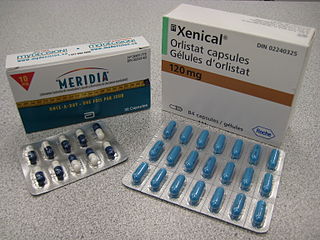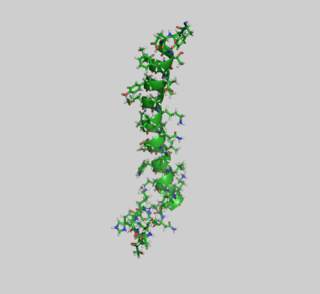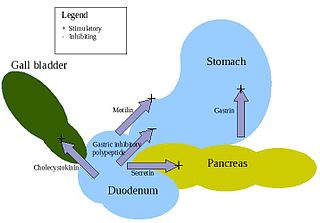
Leptin is a protein hormone predominantly made by adipose cells and its primary role is likely to regulate long-term energy balance.

Ghrelin is a hormone produced by enteroendocrine cells of the gastrointestinal tract, especially the stomach, and is often called a "hunger hormone" because it increases the drive to eat. Blood levels of ghrelin are highest before meals when hungry, returning to lower levels after mealtimes. Ghrelin may help prepare for food intake by increasing gastric motility and stimulating the secretion of gastric acid.

Neuropeptide Y (NPY) is a 36 amino-acid neuropeptide that is involved in various physiological and homeostatic processes in both the central and peripheral nervous systems. It is secreted alongside other neurotransmitters such as GABA and glutamate.

Anti-obesity medication or weight loss medications are pharmacological agents that reduce or control weight. These medications alter one of the fundamental processes of the human body, weight regulation, by altering either appetite, or absorption of calories. The main treatment modalities for overweight and individuals with obesity remain dieting and physical exercise.

Glucose-dependent insulinotropic polypeptide, abbreviated as GIP, is an inhibiting hormone of the secretin family of hormones. While it is a weak inhibitor of gastric acid secretion, its main role, being an incretin, is to stimulate insulin secretion.
Oxyntomodulin is a naturally occurring 37-amino acid peptide hormone found in the colon, produced by the oxyntic (fundic) cells of the oxyntic (fundic) mucosa. It has been found to suppress appetite.

Glucagon-like peptide-1 (GLP-1) is a 30- or 31-amino-acid-long peptide hormone deriving from the tissue-specific posttranslational processing of the proglucagon peptide. It is produced and secreted by intestinal enteroendocrine L-cells and certain neurons within the nucleus of the solitary tract in the brainstem upon food consumption. The initial product GLP-1 (1–37) is susceptible to amidation and proteolytic cleavage, which gives rise to the two truncated and equipotent biologically active forms, GLP-1 (7–36) amide and GLP-1 (7–37). Active GLP-1 protein secondary structure includes two α-helices from amino acid position 13–20 and 24–35 separated by a linker region.

Peptide YY (PYY) also known as peptide tyrosine tyrosine is a peptide that in humans is encoded by the PYY gene. Peptide YY is a short peptide released from cells in the ileum and colon in response to feeding. In the blood, gut, and other elements of periphery, PYY acts to reduce appetite; similarly, when injected directly into the central nervous system, PYY is also anorexigenic, i.e., it reduces appetite.

Enteroendocrine cells are specialized cells of the gastrointestinal tract and pancreas with endocrine function. They produce gastrointestinal hormones or peptides in response to various stimuli and release them into the bloodstream for systemic effect, diffuse them as local messengers, or transmit them to the enteric nervous system to activate nervous responses. Enteroendocrine cells of the intestine are the most numerous endocrine cells of the body. They constitute an enteric endocrine system as a subset of the endocrine system just as the enteric nervous system is a subset of the nervous system. In a sense they are known to act as chemoreceptors, initiating digestive actions and detecting harmful substances and initiating protective responses. Enteroendocrine cells are located in the stomach, in the intestine and in the pancreas. Microbiota plays key roles in the intestinal immune and metabolic responses in these enteroendocrine cells via their fermentation product, acetate.

Motilin receptor is a G protein-coupled receptor that binds motilin. It was first cloned in 1999 by Merck Laboratories. and scientists have since been searching for compounds to modify its behavior.
Bariatric surgery is the medical term for a variety of procedures dealing with obesity. Long term weight loss through the standard of care procedures is largely achieved by altering gut hormone levels responsible for hunger and satiety, leading to a new hormonal weight set point. Bariatric surgery is the most effective treatment causing weight loss and reducing complications of obesity.
Sir John Stewart Savill, FRS, FMedSci is the Chief Executive of the Medical Research Council (MRC) in the UK and the Head of the College of Medicine and Veterinary Medicine and a Vice Principal of the University of Edinburgh.

G protein-coupled receptor 119 also known as GPR119 is a G protein-coupled receptor that in humans is encoded by the GPR119 gene.

Sir Stephen Patrick O'Rahilly is an Irish-British physician and scientist known for his research into the molecular pathogenesis of human obesity, insulin resistance and related metabolic and endocrine disorders.

Rajesh Vasantlal Thakker is May Professor of Medicine in the Nuffield Department of Clinical Medicine at the University of Oxford and a fellow of Somerville College, Oxford. Thakker is also a Consultant physician at the Churchill Hospital and the John Radcliffe Hospital, Principal investigator (PI) at the Oxford Centre for Diabetes, Endocrinology and Metabolism (OCDEM) and was Chairman of the NIHR/MRC Efficacy and Mechanism Evaluation (EME) Board until Spring 2016.

Patrik Rorsman FRS FMedSci is Professor of Diabetic Medicine at the Oxford Centre for Diabetes, Endocrinology and Metabolism (OCDEM), in the Radcliffe Department of Medicine at the University of Oxford and a fellow of Harris Manchester College, Oxford.

Daniel Joshua Drucker is a Canadian endocrinologist. A Fellow of the Royal Society, he is a professor of medicine at the Lunenfeld-Tanenbaum Research Institute, Mount Sinai Hospital, Toronto. He is known for his research into intestinal hormones and their use in the treatment of diabetes and other metabolic diseases.
Hilda Tracy worked at University of Liverpool, UK, with Rod Gregory FRS to isolate and characterise the gastrointestinal hormone gastrin. She led the structure-function studies and had the first insight into gastrin's role in the clinical pathology of pancreatic Zollinger-Ellison tumours.

Vengalil Krishna Kumar Chatterjee is a British endocrinologist. He is a professor of endocrinology in the Department of Medicine at the University of Cambridge and a fellow of Churchill College, Cambridge. He is also the director of the Cambridge Clinical Research Centre, part of the National Institute for Health Research (NIHR).
Rachel Louise Batterham is a British physician who is a professor of Obesity, Diabetes and Endocrinology at University College London. She established the University College London Hospitals NHS Foundation Trust Bariatric Centre for Weight Management and Metabolic Surgery. She has extensively studied obesity, and has contributed to clinical management and the understanding of obesity-related diseases.















